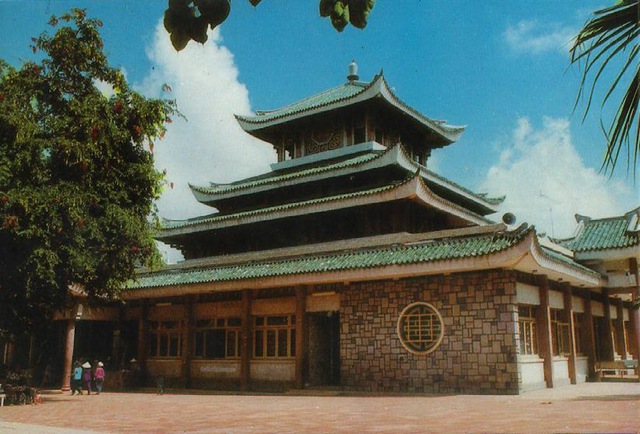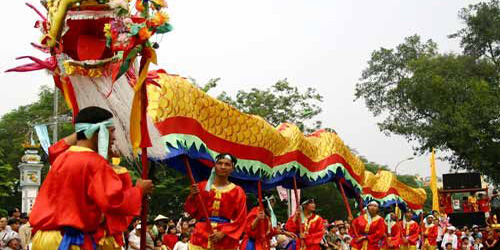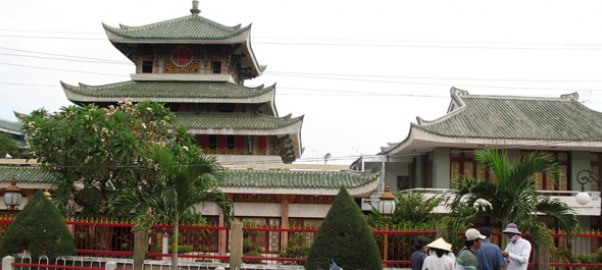As usual in April of the lunar calendar, locals in Chau Doc District, An Giang Province in southern Vietnam and others in provinces nationwide go on a pilgrimage to Sam Mountain to worship Ba Chua Xu (Lady of the Region).
According to legend, nearly 200 years ago Sam Mountain was desolate, bushy and thinly populated. It was the home of many wild beasts. At that time, the invaders often pestered the life of locals here. One day, a squad of invaders climbed up Sam Mountain and found a beautiful stone lady statue. They wanted to take the statue but could not move it. In anger, they disfigured the statue, breaking off the left hand.

Shortly after, a little girl who had been playing joyfully in the village started shaking uncontrollably and began very flush. She called herself as Chua Xu Thanh Mau (Lady of the Region) and said that the statue of the Lady on Sam Mountain was destroyed by the invaders so the villagers should take the sculpture down from the mountain. When the villagers climbed up the mountain they were very surprised when seeing the statue.
They selected nine girls to carry the statue. When arriving at the foot of Sam Mountain, the statue became so heavy that the girls were forced to place it on the ground. The village elders understood this as a signal from the statue that this was the place that it wanted to remain so a ceremony was held and a shrine was built on the spot to dedicate to her. That day was the 25th day of lunar April. Since then, the locals usually hold the Lady worshipping ceremony. At present, on Sam Mountain still remains a vestige of a stone platform where the statue was located.

The Lady Shrine was initially built from bamboo and it was rebuilt in 1870. In 1972, the Shrine was again rebuilt but much larger than before. The architecture of the Shrine has the shape of Chinese script “nation” with a lotus-shaped tower and three-layer roof that is curved like the bow of the boat. The Shrine is roofed with blue tiles. The patterns and designs on the sanctum feature Indian art. Above are strong and beautiful genie statues using their hands to prop up the beams that were carved and engraved finely and sophisticatedly. The Shrine also boasts many red-lacquered panels and couplets. Particularly, the wall behind the statue and four ancient columns have been kept intact.
The statue bears the Oc Eo Culture with the fine arts motifs of the Ba La Mon (Brhmanes) religion originating from India, similar to the four-hand statue in Linh Son Pagoda in Oc Eo Township , Thoai Son District, An Giang Province.
At present, all rites of the festival are held solemnly. At midnight on the 23rd day and in the early morning of the 24th day of lunar April, the statue-bathing rite is carried out for nearly one hour by four or five prestigious middle-aged women in the village. They bathe the statue in water fragranced with jasmine, spray it with perfume and then adorn the statue with a new bonnet and gown. Although the ceremony is held behind a silk curtain, it attracts the participation of thousands people who stand outside the sanctum.

On the night of the 25th day of lunar April and in the early morning of the 26th day, Tuc Yet and Xay Chau, the major rites of the festival, are carried out. At midnight, the Tuc Yet rite is performed by the main priest and four nobles. The offerings include a white pig, a plate of pig’s blood, a tray of steamed sticky rice, a tray of five-fruits, etc. To the ceremonial music and drum and gong beats, the main priest and four nobles offer the Lady incense, wine and tea and read sermons.
After the Tuc Yen rite is the Xay Chau rite. The main priest drips a branch of poplar in a water bowl and splashes the water while reading “first, praying to heaven for good things; second, praying to the land for a bumper crop; third, praying for mankind’s longevity; fourth, praying for annihilating demons”. When he finishes the rite, he beats three salvos of drumbeats to begin the Hat boi (classical opera) performance on the stage before the central sanctum. At 4am on the 27th day of lunar April, the Chanh Te rite is held, but is less spectacular.
Ba Chua Xu Worshipping Festival has become a great cultural event in Southern Vietnam that annually attracts about 2 million tourists nationwide who hope to ask for blessings and witness a typical cultural feature in An Giang Province.
